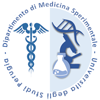- Immune tolerance regulation via tryptophan metabolism in autoimmune diseases, cancer and chronic inflammation. (Prof. Puccetti, Prof. Grohmann, Prof. Fallarino, Prof. Belladonna, Dott. Orabona, Dr. Gargaro);
- Indoleamine 2,3-dioxygenase 2 (IDO2) expression and polymorphism in human cancer. (Prof. Puccetti, Prof. Grohmann, Prof. Fallarino, Prof. Belladonna, Dott. Orabona, Dott. Gargaro);
- Molecular mechanisms of cytokines in tolerance and autoimmunity. (Prof. Puccetti, Prof. Grohmann, Prof. Fallarino, Prof. Belladonna, Dott. Orabona, Dr. Gargaro);
- Role of metabolites and metabolite sensors in innovative immunotherapy approaches. (Prof. Puccetti, Prof. Grohmann, Prof. Fallarino, Prof. Belladonna, Dott. Orabona, Dott. Gargaro);
- Dendritic cell subsets in immunoregulation in tumor and autoimmune and in rare diseases (Prof. Puccetti, Prof. Grohmann, Prof. Fallarino, Prof. Belladonna, Dr. Orabona, Dr. Gargaro);
- Attenuated blood stage parasites as a new strategy for the development of vaccine against malaria disease (Prof. Spaccapelo);
- Defining the rules of engagement: the study of collective behaviour to bridge knowledge gaps in An. gambiae mating (Prof. Spaccapelo and Dr. Peirce) ;
- Investigating the mosquitoes microbiome for the identification of new symbionts to develop new strategy for malaria vector control (Prof. Spaccapelo and Dr. Peirce);
- Role of metabolites in innovative immunotherapy approaches against malaria disease (Prof. Spaccapelo);
- Study of the mechanisms of interaction between the host immune system and fungi as opportunistic pathogens (Prof. Zelante);
- Setting of 3D human/mouse organoid model of infection (Prof. Zelante);
- Probiotic use in oral mucositis (Prof. Zelante);
- Investigating the biology of muscle precursor cells, muscle regeneration, muscle atrophy (including sarcopenia and cancer cachexia), muscular dystrophy, and rhabdomyosarcoma, with particular regards to RAGE (receptor for advanced glycation end-products) and the calcium-binding protein S100B (Prof. Sorci);
- Investigating the intraperitoneal injection of microencapsulated Sertoli cells as a treatment to Duchenne muscular dystrophy (Prof. Sorci);
- Investigating the molecular alterations induced by microgravity in human satellite cells (Prof. Sorci);
- Investigating the efficacy of herbal extracts in counteracting muscle atrophy (Prof. Sorci);
- Rare diseases involving Vitamin B6-dependent enzymes: molecular
pathogenesis and development of new therapeutic strategies (Prof. Cellini); - Sertoli cell: an endocrine cellular system employed for treatment of type 1 and 2 diabetes mellitus, other autoimmune disorders, cell transplant and male infertility (Prof. Luca G., Dr. Calvitti M.);
Tematiche di Ricerca
- Dettagli
- Scritto da Gianluca Andrielli


